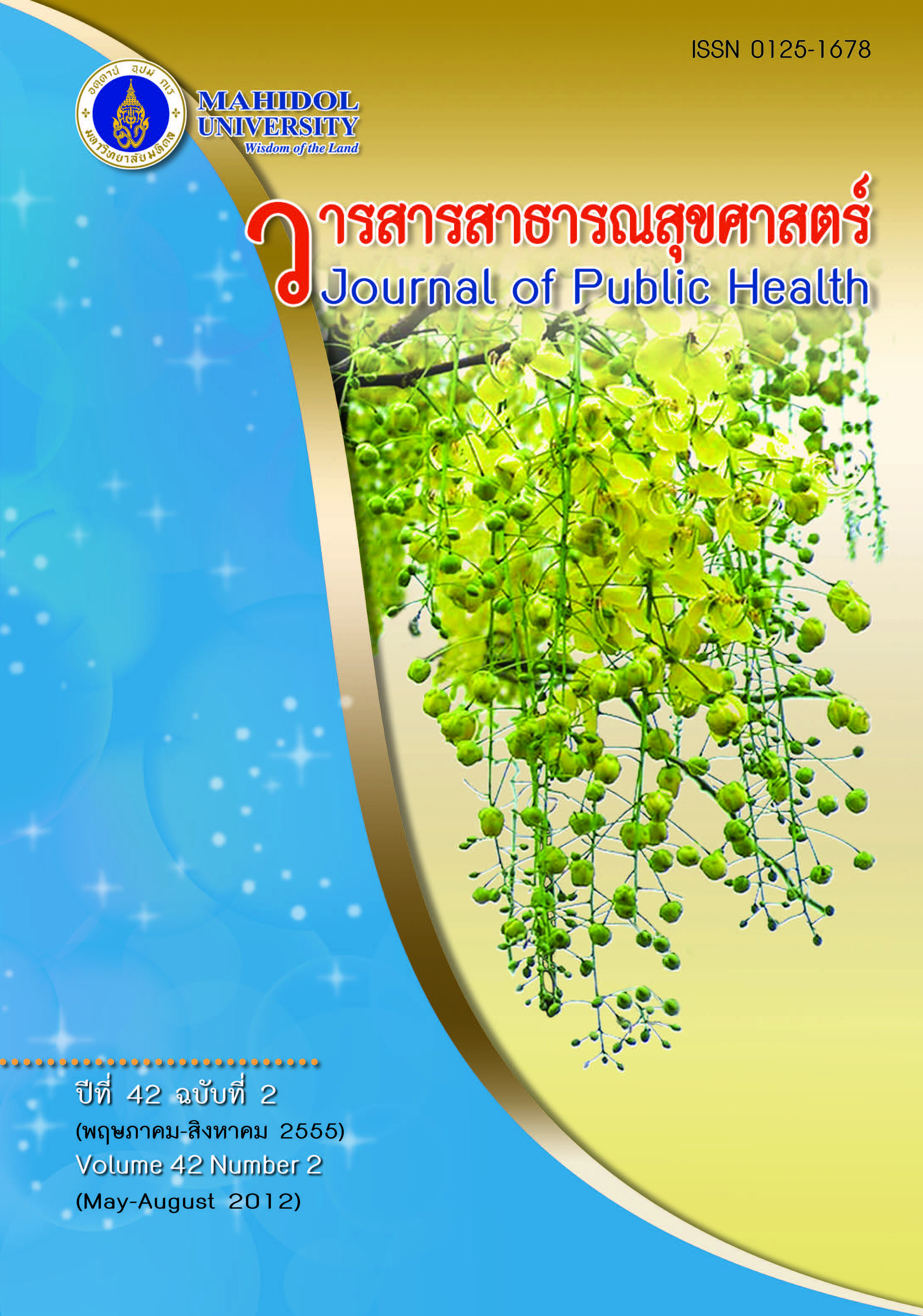ปัจจัยที่มีผลต่อพฤติกรรมการจัดการตนเองของผู้ที่เป็นโรคข้อเข่าเสื่อม
Keywords:
โรคข้อเข่าเสื่อม, พฤติกรรมการจัดการตนเอง, osteoarthritis, self-management behaviorAbstract
บทคัดย่อ
โรคข้อเข่าเสื่อมพบมากในกลุ่มผู้สูงอายุ การปฏิบัติตัวที่ไม่ถูกต้องอาจเกิดอาการรุนแรงได้ ภายใน 1-3 ปี การวิจัยเชิงสำรวจนี้มีวัตถุประสงค์ เพื่อศึกษาปัจจัยที่สัมพันธ์และทำนายพฤติกรรม การจัดการตนเองเพื่อป้องกันความรุนแรงของโรค ข้อเข่าเสื่อมของผู้ป่วย จำานวน 200 คน รวบรวม ข้อมูลโดยการสัมภาษณ์ วิเคราะห์ข้อมูลด้วยสถิติ ไค-สแควร์ สัมประสิทธิ์สหสัมพันธ์แบบเพียร์สัน และ วิเคราะห์การจำแนกพหุ ผลการศึกษาพบว่า ความรู้ การรับรู้ความสามารถในการจัดการตนเอง การได้รับ แรงสนับสนุนทางสังคม และการเข้าร่วมกิจกรรม สร้างเสริมความรู้และทักษะจากโรงพยาบาล มีความ สัมพันธ์กับพฤติกรรมการจัดการตนเอง อย่างมีนัย สำคัญทางสถิติ (p<0.05) ส่วน เพศ อายุ สถานภาพ สมรส ระดับการศึกษา อาชีพ รายได้ ดัชนีมวลกาย ระยะเวลาที่เป็นโรค ความรุนแรงของโรค และ การรับรู้ความรุนแรงของโรคไม่มีความสัมพันธ์กับ พฤติกรรมการจัดการตนเอง จากแบบจำลองการ วิเคราะห์การจำแนกพหุ 7 ปัจจัย คือ ความรู้เกี่ยวกับ โรคข้อเข่าเสื่อม การรับรู้ความรุนแรงของโรค การรับรู้ ความสามารถในการจัดการตนเอง การเข้าร่วมกิจกรรม สร้างเสริมความรู้และทักษะ การได้รับแรงสนับสนุน ทางสังคมจากบุคลากรในโรงพยาบาลและจากบุคคล ในครอบครัว และระดับความรุนแรงของโรคข้อเข่าเสื่อม สามารถร่วมกันทำนายความแปรปรวนของพฤติกรรม การจัดการตนเองของผู้ป่วยโรคข้อเข่าเสื่อม ได้ร้อยละ 30 (R2= 0.296 ) เมื่อควบคุมอิทธิพลของปัจจัยอื่นๆ แล้ว พบว่าการรับรู้ความสามารถในการจัดการตนเอง เป็นปัจจัยที่มีความสำคัญต่อพฤติกรรมการจัดการ ตนเองมากที่สุด รองลงมาคือ การได้รับแรงสนับสนุน ทางสังคมจากบุคลากรของโรงพยาบาล (Beta = 0.32 และ 0.21 ตามลำดับ) ดังนั้นการส่งเสริมให้ ผู้ป่วยโรคข้อเข่าเสื่อมมีพฤติกรรมการจัดการตนเอง เพื่อป้องกันความรุนแรงของโรค ควรเน้นการพัฒนา การรับรู้ความสามารถในการจัดการตนเองและ การให้แรงสนับสนุนทางสังคมจากบุคลากรของ โรงพยาบาล
คำสำคัญ: โรคข้อเข่าเสื่อม; พฤติกรรมการจัดการตนเอง
ABSTRACT
Osteoarthritis of the knee is commonly found among elderly. Performing risk behaviors will accelerate its severity within 1 to 3 years. This survey research aims to study the factors related to and predict self-management behaviors of 200 samples. Data were collected by interviewing and were analyzed by Chi square test, Pearson’s product moment correlation, and Multiple Classification Analysis. The study results showed that the knowledge, self-efficacy to perform self-management, receiving social support, and participation in knowledge and skill enhancement activities provided by the orthopedic unit were significantly related to self-management behaviors. However, the relationship between gender, age, marital status, educational level, occupation, income, body mass index, duration of having osteoarthritis, perceived severity of the osteoarthritis and self-management behaviors was not found. From Multiple Classification Analysis model, it was found that 30 percent of the variance of self-management behaviors (R2=0.296) could be explained by the seven factors: knowledge regarding osteoarthritis, perceived severity of the disease, perceived self-efficacy, participation in knowledge and skill enhancement activities, receiving social support from personnel in hospital and family member, and severity of the disease. Once the effect of all other factors were taken into account, perceived self-efficacy was found to be the most important factor in performing self-management behaviors (Beta=0.32) followed by social support from the orthopedic unit staffs (Beta=0.21). Therefore, to promote selfmanagement behaviors of the osteoarthritis patients, learning activities should be emphasized more on the enhancement of selfeffi cacy to perform self-management, and providing social support from the orthopedic unit staffs.
Key Words: osteoarthritis; self-management behavior
Downloads
Issue
Section
License
Creative Commons License CC-BY-ND


